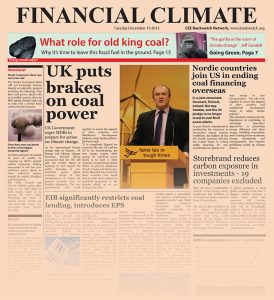Fifteen years after Bankwatch began requesting information from the European Investment Bank, only to receive the terse reply “We are accountable only to the market,” the campaign to reform the EU’s house bank took another step forward towards making the world’s largest public lender a leader in the fight against climate change.

While the EIB has made strides in recent years greening its energy portfolio, the bank continues to spend entirely too much on dirty, climate-damaging fossil fuels. The review of the EIB energy lending policy presented an opportunity to reverse this trend and bring the bank in line with the EU’s long-term climate commitments, and Bankwatch jumped on it.
Even before the revision was formally launched in December 2012, Bankwatch was knocking on the doors of decision-makers in European capitals, enlisting the support of other civil society groups, business associations and think tanks and making appearances in the media.
Facilitating a strong and concerted campaign, which included by far more than a hundred participants during the consultation meeting and almost 90 formal written submissions to the bank (including at least two from the European Commission), Bankwatch helped secure by summer 2013 a climate-friendly policy that all but eliminated the possibility of support for coal, the dirtiest of all fossil fuels.
The domino effect

With the introduction of a so-called Emissions Performance Standard, the new policy requires the EIB to refrain from financing the most carbon-intensive power generation.
Additionally with last-minute pressure exerted by the bank’s board, loopholes in the policy were removed that could have enabled sneaky backdoor financing for virtually all types of energy projects.
The new policy is a win not only for the EIB campaign but pays dividends during Bankwatch’s work to green international public energy lending.
With the EIB joining the World Bank and other financing institutions in a move away from financing coal power, all eyes were on the European Bank for Reconstruction and Development (EBRD) which began reviewing its energy strategy in the second half of 2013.
Following an even larger mobilisation that included allies like 350.org and Sierra Club, also the EBRD significantly restricted its coal lending.
